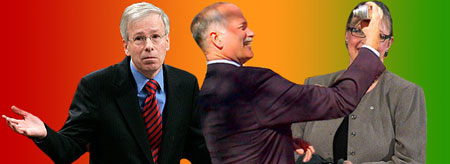I just received the below action appeal from Camille Labchuk. Please take a moment to read it and do as she asks. The fact that this rule exists at all is ridiculous, as it punishes youth for being actively involved with their democracy. The fact that the CBC would treat her in the way she describes is even worse. I’ve added emphasis to what I believe are the key points.
ACTION ALERT: CBC kicked me out of the Next PM contest. Help me expose this injustice.
Hi friends,
I just received the shocking news that CBC has disqualified me from the Canada’s Next Great Prime Minister contest. They say it is because I ran for Parliament in 2006, but when they asked me to enter the competition in November (yes, they recruited me) I raised this point with the producer and asked if it made me ineligible. The producer told me (in writing) that I was “good to go.â€
Until today, I was a front runner in the contest. Thanks to your support, my entry video got more votes than any other contestant. I devoted all of my free time to this competition over the past two months. My campaign team and I spent over 200 hours researching policy, filming videos, organizing online and encouraging people to vote for me. My efforts paid off and I was slated to become the Web Winner next week when voting closes, meaning I would have automatically advanced to the semifinals.
Another contestant has run for Parliament yet has not been deleted from the CBC’s website, like I have. There are 31 additional contestants whose videos are either too short or too long to comply with the entry rules and, according to the rules, should be disqualified too. I don’t think these candidates should be kicked out and I don’t think I should be kicked out either. CBC let us enter this competition, allowed us to spend two months of our lives on it, and they should let us finish it. I have asked CBC if they will disqualify these other candidates and they refuse to answer me.
The intent of the Next Great PM contest was supposedly to encourage youth political engagement. This outrageous treatment of a contestant who has poured her heart and soul into the contest sends an opposite message: “get involved, get kicked out.” I am appalled that our publicly funded broadcaster sees fit to backtrack on its word. I am also shocked that major sponsor Magna, run by former MP Belinda Stronach, would accept this. Ms. Stronach has had to fight every step of the way to climb to the top in politics and I can’t imagine that she would support this treatment of a young Canadian who loves politics and simply wants to make a difference.
CBC and Magna chose to disqualify the wrong young Canadian. I am launching a major campaign to draw attention to this abuse. I feel utterly crushed that my efforts have been for nothing and I refuse to just quietly go away. I will be retaining counsel and intend, if necessary, to pursue legal action against the CBC for unfair disqualification. Lawyers cost money and this is going to be difficult for me to take on financially, so if you want to contribute to my legal fund, write to me. I feel it’s the only way to hold CBC accountable.
Please help me expose this injustice by contacting CBC and Magna to tell them their actions are reprehensible. Write to:
seema.patel@cbc.ca (Seema Patel, Senior Producer)
matthew.barrington@cbc.ca (Matt Barrington, Producer)
ht.lacroix@cbc.ca (Hubert Lacroix, CBC President)
mary_gittens@magna.on.ca (Mary Gittins, Magna)Copy your emails to me (cflbchk@mta.ca) so I can track support!
Thanks for standing with me.
Camille
